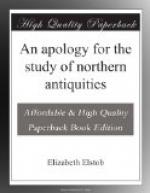The answerers who rushed into print in 1712 against Swift’s Proposal for Correcting, Improving and Ascertaining the English Tongue were so obviously moved by the spirit of faction that, apart from a few debating points and minor corrections, it is difficult to disentangle their legitimate criticisms from their political prejudices. As Professor Landa has written in his introduction to Oldmiron’s Reflections on Dr. Swift’s Letter to Harley and Mainwaring’s The British Academy (Augustan Reprint Society, 1948): “It is not as literature that these two answers to Swift are to be judged. They are minor, though interesting, documents in political warfare which cut athwart a significant cultural controversy.”
Elizabeth Elstob’s Apology for the Study of Northern Antiquities prefixed to her Rudiments of Grammar for the English-Saxon Tongue is an answer of a very different kind. It did not appear until 1715; it exhibits no political bias; it agrees with Swift’s denunciation of certain current linguistic habits; and it does not reject the very idea of regulating the language as repugnant to the sturdy independence of the Briton. Elizabeth Elstob speaks not for a party but for the group of antiquarian scholars, led by Dr. Hickes, who were developing and popularizing the study of the Anglo-Saxon origins of the English language—a study which had really started in the seventeenth century.
What irritated Miss Elstob in the Proposal was not Swift’s eulogy or Harley and the Tory ministry, but his scornful reference to antiquarians as “laborious men of low genius,” his failure to recognize that his manifest ignorance of the origins of the language was any bar to his pronouncing on it or legislating for it, and his repetition of some of the traditional criticisms of the Teutonic elements in the language, in particular the monosyllables and consonants. Her sense of injury was personal as well as academic. Her brother William and her revered master Dr. Hickes were among the antiquarians whom Swift had casually insulted, and she herself had published an elaborate edition of An English-Saxon Homily on the Birthday of St. Gregory (1709) and was at work on an Anglo-Saxon homilarium. Moreover she had a particular affection for her field of study, because it had enabled her to surmount the obstacles to learning which had been put in her path as a girl, and which had prevented her, then, from acquiring a classical education. Her Rudiments, the first Anglo-Saxon grammar written in English, was specifically designed to encourage ladies suffering from similar educational disabilities to find an intellectual pursuit. Her personal indignation is shown in her sharp answer to Swift’s insulting phrase, and in her retaliatory classification of the Dean among the “light and fluttering wits.”
As a linguistic historian she has no difficulty in exposing Swift’s ignorance, and in establishing her claim that if there is any refining or ascertaining of the English language to be done, the antiquarian scholars must be consulted. But it is when she writes as a literary critic, defending the English language, with its monosyllables and consonants, as a literary medium, that she is most interesting.




